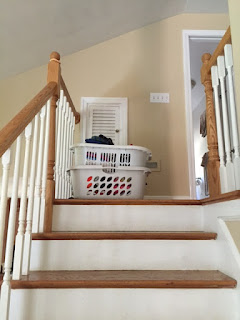That morning of my check-up, however, something came over me. I very rare swear, but as I pulled into the parking lot, I decided to turn into a spot just next to the spot I had parked on August 8, 2012 when the radiologist told me I had cancer. "F#&k that," I said out loud to myself. By "that," I think I meant cancer.
It was a small victory, parking in the dreaded section of the lot that I had so avoided for three years. But it was a victory nonetheless.
Today, I had a similar victory. Ever since Halloween day 2012, I have refused to wear anything that I had been wearing that day. I gave away the clothes I had worn, and I was spooked by the homemade skeleton earrings that had accompanied by newly bald head. Without any real thought, I assumed those earrings were bad luck or had bad vibes or were ... something bad. Actually, I don't really know what I thought. I just associated those skeleton earrings with the day that I learned I was deathly allergic to my chemotherapy, and that was not a fun day.
This morning, however, as I reached into my jewelry box, I decided I wanted to wear those skeleton earrings. Sure, the last day I wore them I knocked on death's doorstep, but...well, "F&*k that," I whispered to myself as I put them in my ears.
Tonight as I changed out of my clothes and into my pajamas (at 5:30pm), I got to thinking about those earrings, and Halloween, and even that silly parking spot. And with a whole different attitude, and a little smile, I may even have looked in the mirror and said, "F*@k that," to myself. And really, I very rarely swear.
* * *
I barely remember the last time I wrote in my blog. This must be the longest stretch I've ever gone without it. The reasons for my blogging absence boil down to two very simple ones -- (1) every ounce of my energy I have poured into my new teaching job, and (2) I have never been so fulfilled. Granted, there have been some tough times -- a few dark spots when I was convinced that certain pain I felt was my cancer back with a vengeance, and a few sleepless nights wondering if I should begin on medication to shut down my ovaries as another way to lower my risk of recurrence. But all in all, life has never been so good.
With that very last statement (which I deleted thrice and added back each time), comes a bombardment of guilt. Because while I have been blessed to remain cancer-free (I think) and pursue my dream to write and teach, I know that so many other cancer survivors are not as fortunate. In fact, it feels like in the last few months I have heard countless stories about cancer's most relentless nature. Dear friends of mine continue to battle its wrath. And so I admit that I feel guilty. Guilty for my own luck, my own health, and my own healing. It's a whole different kind of "survivor's guilt," I guess.
At the same time, the truth is that "healing" after a cancer diagnosis is not the linear process that everyone wishes it would be. The path is more akin to the footprints of a child lost in the woods. And for someone who has to face cancer more than once, I can't even imagine what it's like.
* * *
There are a few things I try never to say to any cancer patient. "You'll be okay,"* is one of them. Because how do I know? I don't, despite that I live in a culture that likes to make false promises. But none of us know what the next minute will bring. I no longer find that reality depressing or pessimistic. I just know it's reality. Honest. True. Life. (*Please note that stories about people who have beat cancer are different and still very helpful.)
What I do want to tell cancer patients takes more than four little words (or three if you count the contraction). Well, maybe what I want to say is short, too, but it comes from a place of significant thought, I promise. I want to tell them, "You are here now. Please know that. You are. Here. Now." I want to tell them that there is so much light and so much life after a cancer diagnosis, despite the number of sunrises that follow. I want to tell them that there will be bumps -- big ones -- and there may even be some moments when you feel like you ran face first into a brick wall. I know that's how I felt three years ago on Halloween. But I also know that today, without any plan to do so and anyone else even knowing (until this blog, of course), I had a small victory that involved a ridiculous pair of homemade earrings. Skeletons earrings that have survived in my jewelry box for three years.
I see now that healing, like hope and like pain, comes in all shapes and sizes. And I see now that small victories -- like parking spots, earrings, and the quiet whisper to oneself, "F&*k that" -- are victories nonetheless.









